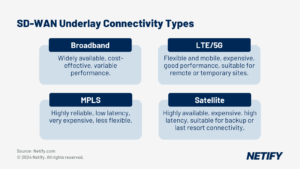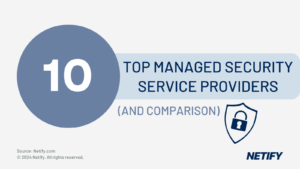| Top healthcare MSPs like Ingenica, iatro, and GE Healthcare streamline operations, improve efficiency, and enhance patient care with services spanning from IT support to equipment management and cloud solutions. |
Managed service providers (MSPs) play an essential role for healthcare providers by ensuring the seamless functionality, offering services aimed at improving efficiency, cutting costs and enhancing patient care.
This article presents an overview of the top healthcare MSPs, showcasing the advantages provided by their service offerings. By evaluating these MSPs, healthcare organisations can make informed choices as to which MSPs are most suitable for their use cases across a range of features, such as cybersecurity, system reliability and workload management.
Table of Contents
Ingenica Solutions (UK)
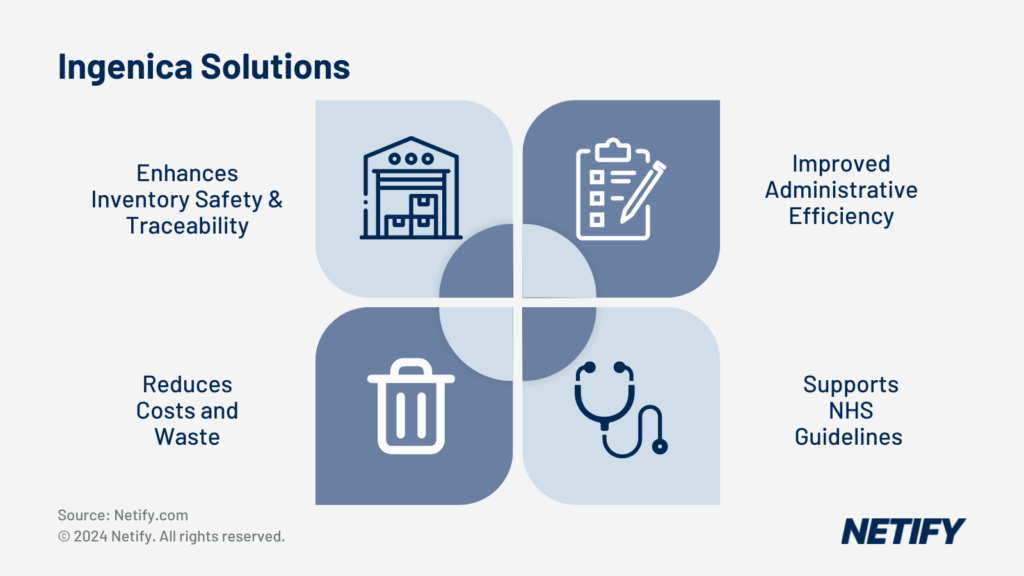
Ingenica Solutions Benefits of Deploying SD-WAN
For healthcare providers requiring improvements to their administrative and back-office operations, Ingenica Solutions has a proven track record for increasing efficiency. Ingenica are well known for being committed to enhancing operations efficiency in healthcare environments within the NHS, with their flagship product, Ingenica 360 further improving this.
Ingenica 360 is an inventory management solution based on the Microsoft Dynamics platform. As the first GS1 UK approved solution for inventory management, Ingenica 360 offers enhanced safety by enabling healthcare providers with visibility and traceability into processes, whilst also increasing efficiency. Ingenica 360 automates inventory monitoring and replenishment processes from warehouse to delivery points to assist NHS trusts in meeting government guidelines, which also leads to cost reductions, minimisation of wastage and reduced burdens on clinical staff.
Ingenica is not limited to its Ingenica 360 platform and goes beyond managing inventory; their services also cover procurement and administrative solutions providing a beneficial way for the NHS to handle day-to-day operations.
Since starting in 2011 Ingenica has quickly become a key player within the healthcare sector for their tools, which offer providers with real-time data and analytics. These help healthcare providers with the decision process, providing strategic insights for improving efficiency and quality of patient care. Ingenica’s focus on innovation through automation and customer satisfaction has made them a reliable partner for healthcare organisations looking to streamline their processes.
iatro (UK)
Founded in 2019 and recently acquired by the Agilio Software Group, iatro is best known for its customised solutions, tailored for primary care organisations within the NHS. To achieve this iatro collaborates with GP practices, primary care networks, care homes and hospices to ensure they meet the need of primary care patients as best as possible.
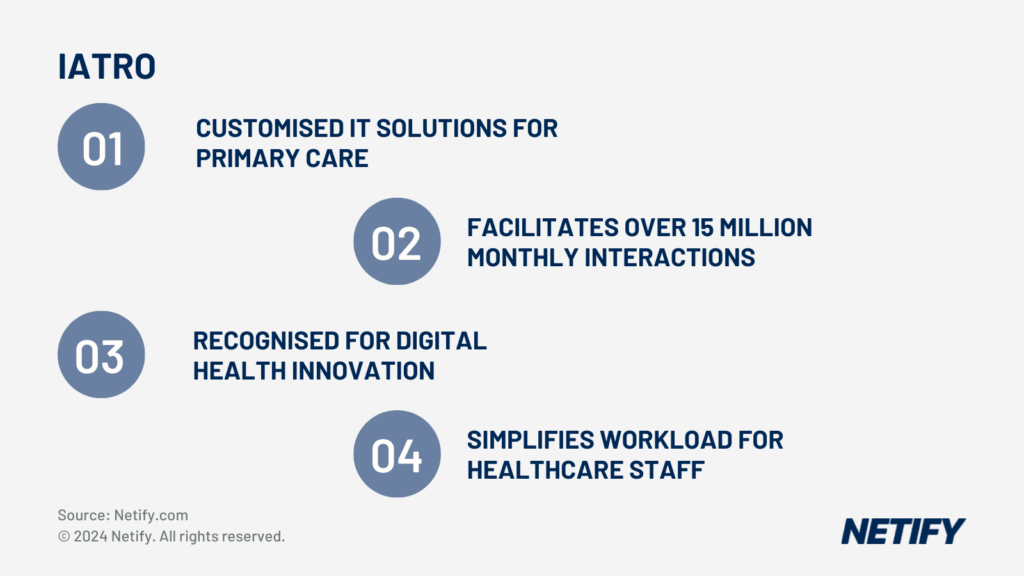
Iatro Benefits of Deploying SD-WAN
Their primary offering comes in the form of Practice365 which provides website design features for GPs, including the hosting of OneContact, enabling practices with digital consultations and clinical workflow management.
iatro’s managed services cover IT support, strategic planning and system expertise to improve healthcare organisations, with reports showing that their solutions facilitate over 15 million interactions monthly by supporting digital consultations and assisting in disease management.
iatros was also recognised as the Best Digital Health Solutions Provider in 2022, due to their collaborative and open approach, which was guided by values like impact, inclusion, integrity and innovation. By integrating iatros services into daily operations, it simplifies workloads for provider staff and allows medical professionals to focus on patient care rather than IT challenges.
GE Healthcare (Global)
General Electric (GE) Healthcare has become a global mainstay in providing medical technology and managed equipment services (MES) to the healthcare sector. Their managed equipment services package is vastly different from traditional equipment ownership models, with healthcare providers adopting the model entrust GE with the management of all medical technology aspects across hospital departments like radiology, ultrasound, patient care units, operating theatres, pathology labs and endoscopy units.
The core elements of GEs MES encompass planning, financial strategy implementation, technology procurement, day-to-day operations oversight and maintenance activities, all of which provide continuous performance improvements and reduced complexity.
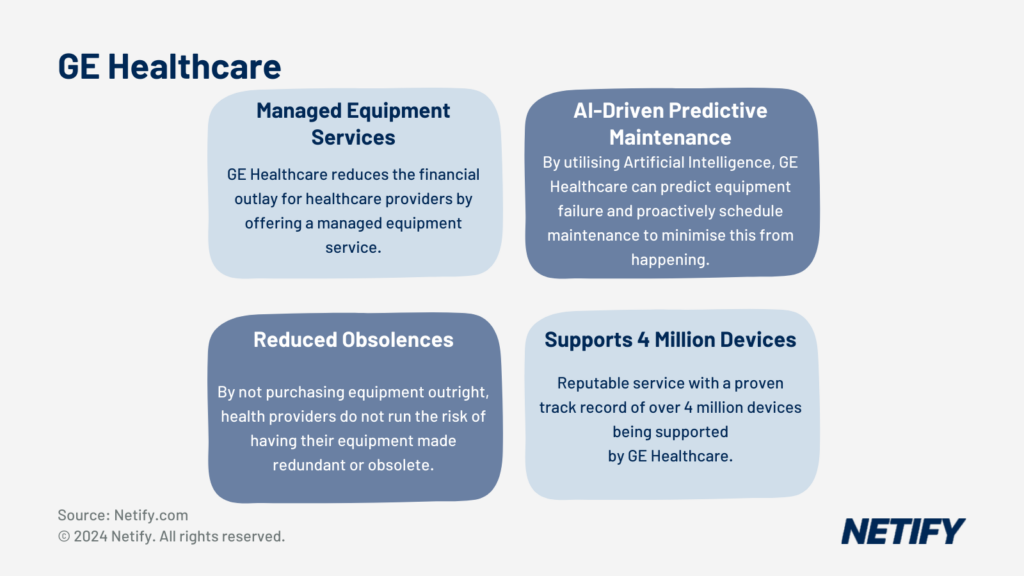
GE Healthcare Benefits of Deploying SD-WAN
Adopting GE’s MES equips healthcare providers with risk management against equipment obsolescence, by reducing owned assets that may become outdated, whilst streamlining overall technology management processes. This is a major benefit for healthcare providers as it reduces the need for constant re-investment in potentially expensive outlays for new equipment and keeps costs regular and managed.
GE Healthcare supports over 4 million devices through a network of 9,000 field engineers spanning across than 160 countries, and their Healthcare Technology Management (HTM) services involve maintaining equipment from vendors using data analysis and digital advancements to enhance the efficiency of asset usage. One way that this has been achieved is through leveraging Artificial Intelligence (AI) to provide predictive maintenance, meaning that, through data, equipment is protected against wear and tear from usages, as maintenance can be scheduled proactively.
TFS Healthcare (UK)
Whilst GE Healthcare covers services for equipment, TFS Healthcare is known for its managed staffing solutions for the healthcare sector. The TFS Healthcare solution helps provide staffing on both a contract and permanent basis, with placements for both NHS and private healthcare settings available. This approach enables healthcare providers to efficiently outsource staffing management tasks, reducing the burden on healthcare organisations and allows a greater focus on care-related activities.
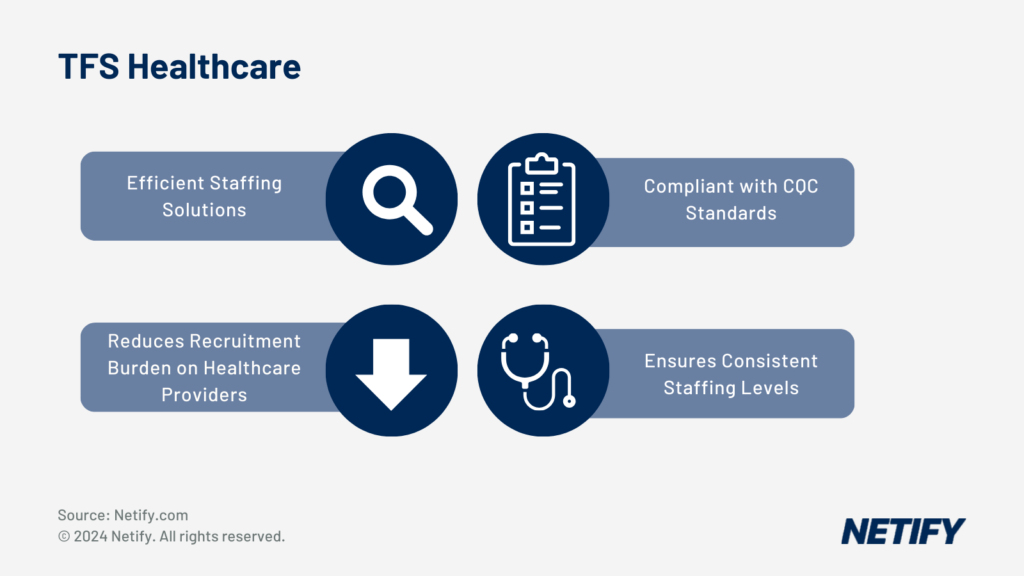
TFS Healthcare Benefits of Deploying SD-WAN
TFS Healthcare is committed to meeting staffing standards as, per the guidelines of the Care Quality Commission (CQC) and has helped them to be shortlisted for two HSJ Partnership Awards in 2023. The range of healthcare professionals available via the TFS Healthcare solution not only simplifies the recruitment process, but ensures consistent staffing levels, protecting against shortages. Leveraging this expertise in recruitment also assists healthcare providers that are interested in cutting costs, as this means that permanent staff can be limited to only those that are required year-round and enables greater cost-efficiency within the workforce.
NHS Professionals (UK)
An alternative to TFS Healthcare, NHS Professionals (NHSP) offers flexible workforce solutions for the NHS across the UK. Owned entirely by the Department of Health and Social Care, NHSP reinvests any profits back into the healthcare system. With a workforce exceeding 180,000 individuals on offer, NHSP aids NHS trusts in saving money through provision of non-clinical staff.
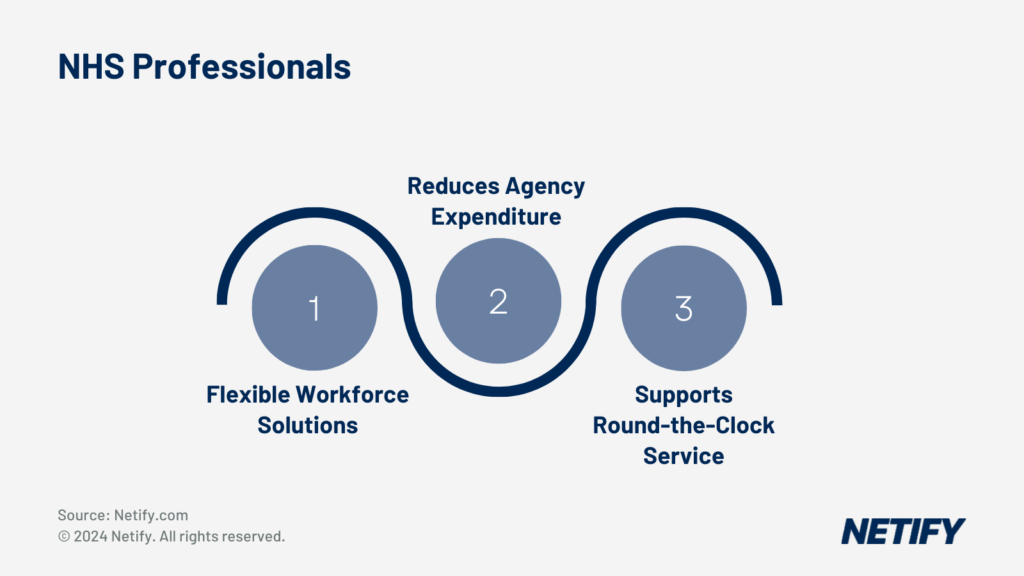
NHS Professionals Benefits of Deploying SD-WAN
Like TFS Healthcare, NHSP can be seen as a way to reduce costs and ease the burden of recruitment, HR and payroll, enabling NHS trusts to focus their efforts on delivering optimal patient care. By providing trusts with easy access to healthcare professionals, it aids staffing coordination, cost savings on agency expenditures and ensures round-the-clock service. This access to professionals is also enhanced by the NHSP Agency Management Services, which collaborate with agencies to boost shift fill rates through their booking platforms. Their dedicated agency support team ensures staffing solutions, with the NHSP playing a role in recruitment campaigns like the Covid 19 Rapid Response programme, in which it recruited 20,000 individuals to support the NHS.
In 2024 NHSP was recognised for “Staffing Solution of the Year” at the HSJ Partnership Awards for their initiatives in reducing agency reliance within an NHS trust. Their holistic approach to staffing solutions and efficient administrative operations greatly enhances the effectiveness of NHS trusts in delivering optimised patient care.
Nordcloud (Global)
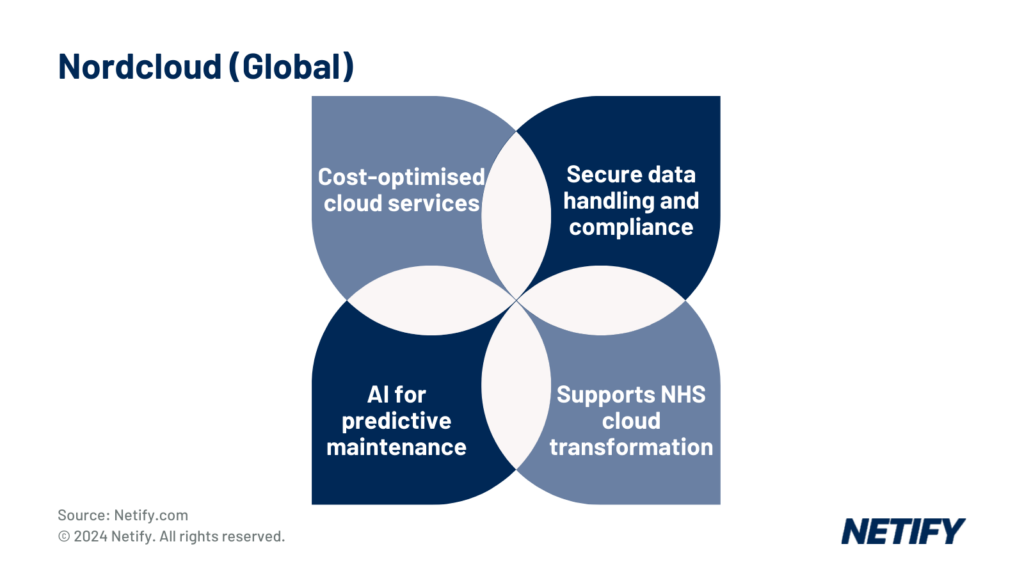
Nordcloud Benefits of Deploying SD-WAN
Whilst previously noted that GE Healthcare minimised the risk of healthcare providers being lumbered with outdated technology, Nordcloud handles healthcare network services, ensuring systems do not become obsolete. Nordcloud is a cloud services provider known for offering managed cloud services, cloud migration assistance, application development services and global training programs. Acknowledged in Gartners Magic Quadrant for Public Cloud Infrastructure Managed Service Providers, Nordcloud addresses healthcare sector challenges such as costs, data security concerns and outdated software applications.
Nordcloud’s offerings focus on cost optimisation by utilising cloud services for improved scalability, secure data handling, digitisation of applications and cloud training programs. Services from Nordcloud are compatible across multiple platforms, along with certifications for Amazon Web Services (AWS), Azure and Google Cloud Platform (GCP). Moving to the cloud offers healthcare providers with greater computational power, integrated security and the ability to easily scale to meet volatile demands and this adaptability enables a reduction in financial outlay whilst still being able to cope with demand.
In the United Kingdom, Nordcloud has teamed up with IBM to establish a Cloud Centre of Excellence that supports the cloud transformation of NHS England. This centre offers guidance, frameworks and expertise to assist NHS trusts in adopting cloud technology.
Nordcloud has a strong emphasis on security and regulatory compliance, which guarantees that healthcare providers can fulfil regulation criteria and offers further potential benefits such as disaster recovery and cloud backup solutions.
KPMG (Global)
KPMG offers a managed service that enable healthcare organisations to provide tailored solutions for patients by removing the responsibility of process handling from healthcare providers. KPMG offers solutions to meet regulatory compliance and security needs and surpasses alternative outsourcing methods through an integrated partnership model where KPMG acts as an extension of the clients team. This method ensures that the client retains control and through KPMGs Connected Healthcare framework, operational strategies are improved.
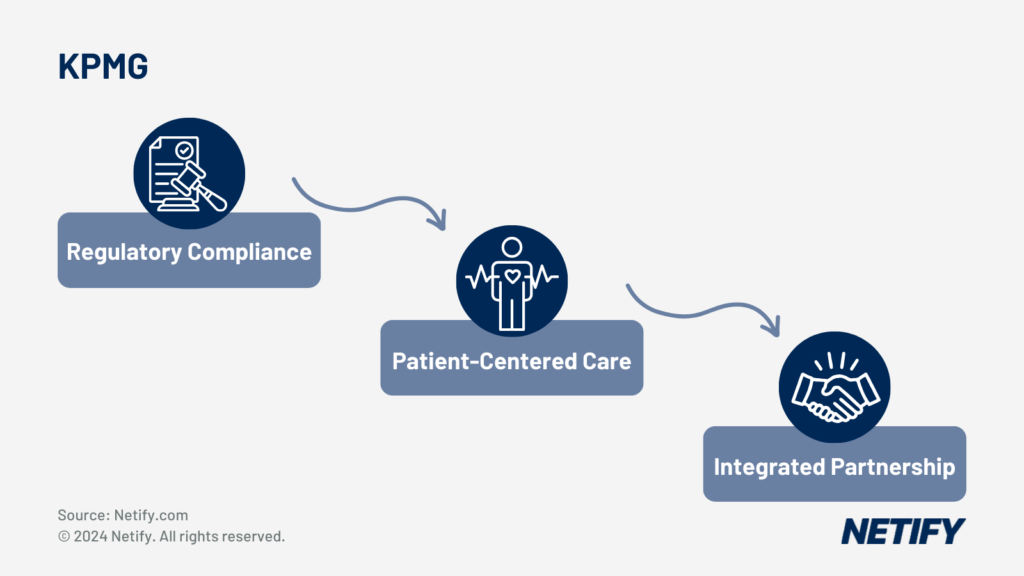
KPMG Benefits of Deploying SD-WAN
In the United Kingdom, KPMG has played a role in aiding the NHS in tackling waiting list backlogs derived from Covid-19, and by revamping services to prioritise patient-focused care, KPMG assists NHS trusts in providing improved, timely care.
Accenture (Global)
Similarly to KPMG, Accenture provides a wide array of managed services and consulting solutions to the healthcare sector. Accenture’s health consulting division supports organisations in adopting new technologies and enhancing process efficiency, which are both key factors for improving patient experiences and achieving optimal outcomes.
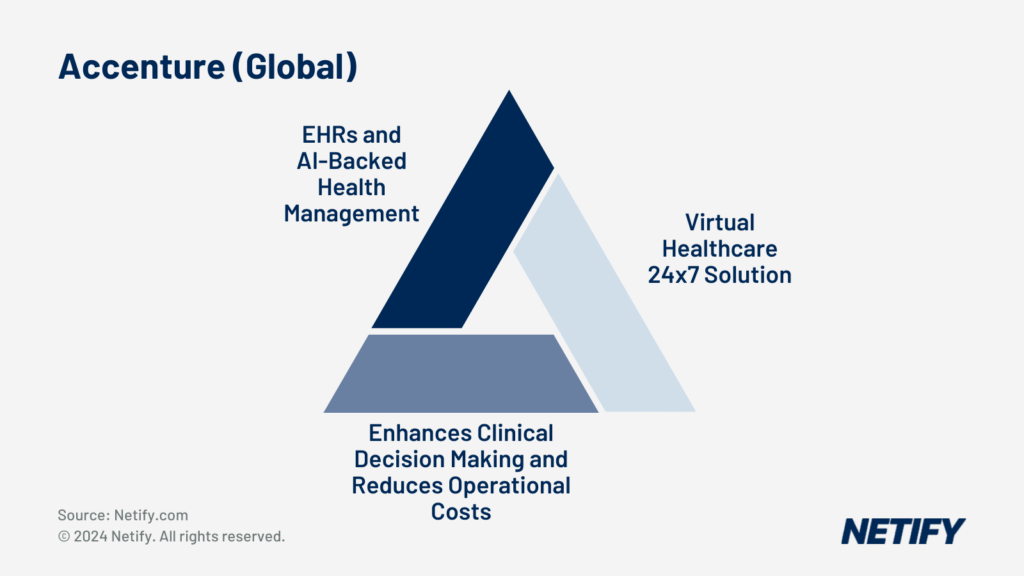
Accenture Benefits of Deploying SD-WAN
Accenture provides a variety of services such as electronic health records (EHRs), AI and machine learning-backed health management services, alongside cybersecurity solutions. The health management services on offer assist with health risk assessments, patient support services and care coordination.
In an effort to reduce costs, Accenture focuses its process for outsourcing services by utilising analytics and automation, ensuring healthcare providers can operate efficiently. Accentures specialised platform, Accenture Healthcare, utilises Azure services to enable widespread studying of genomic and population health research, by offering analytics for improved clinical decision making.
In 2023, Accenture acquired Nautilus Consulting, strengthening their capabilities for EHR implementations. This isn’t the only way that Accenture has strengthened its offering though, as Accenture has collaborated with healthcare providers to develop solutions like Virtual Healthcare 24×7, a solution that leverages Microsoft technologies for remote care delivery. Their extensive experience in healthcare and life sciences assists biopharma and medtech companies in revamping operating models, whilst also improving both efficiency and security.
IBM
World-renowned for their production of technology, IBM also offers a range of managed services and cloud solutions specifically designed for the healthcare industry. IBM focuses on key areas for improvement, such as insights from health data analysis, strategies for patient experience improvement and modernisation of outdated medical technologies.
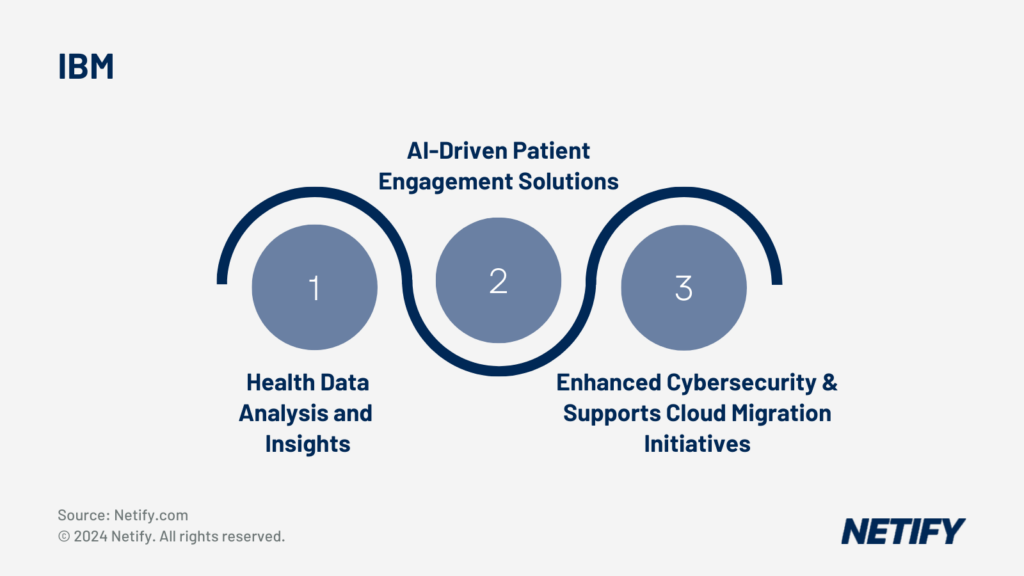
IBM Benefits of Deploying SD-WAN
Their range of managed services, such as IBM Power Systems and IBM Cloud, offer healthcare providers with operational management and with their cloud services, can leverage artificial intelligence (AI) for enhanced decision making and enhanced cybersecurity to protect the confidentiality and integrity of patient data.
The health data and insights provided by IBM to supports providers in enhancing patient care outcomes and ensures management of healthcare IT systems to assist healthcare providers in delivering optimised care.
Whilst being known globally for their general-use technology, IBM also boasts notable achievements within the health sector, which include cloud migration initiatives for the NHS and AI driven patient engagement solutions for Humana.
